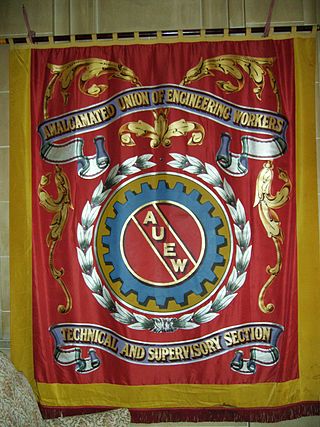Related Research Articles

The Technical, Administrative and Supervisory Section (TASS) was a British trade union.

The Modern Records Centre (MRC) is the specialist archive service of the University of Warwick in Coventry, England, located adjacent to the Central Campus Library. It was established in October 1973 and holds the world's largest archive collection on British industrial relations, as well as archives relating to many other aspects of British social, political and economic history.
Robert Lever Howarth was a British politician from Bolton who was a Member of Parliament (MP) for Bolton East from 1964 to 1970.
Ken Gill was a British trade union leader. He was the General Secretary of the Technical, Administrative and Supervisory Section (TASS), from 1974 to 1988, when it merged with ASTMS to form the Manufacturing, Science and Finance Union (MSF). He was General Secretary of the MSF, 1988–1992, initially jointly with Clive Jenkins. A committed Communist, he was elected to the TUC General Council in 1974, and was a prominent figure in the militant industrial relations of the 1970s. From 1981 to 1987 he was a member of the Commission for Racial Equality.
James Edward Mortimer was a British trade unionist and the Labour Party General Secretary between 1982 and 1985.
George Walker Thomson was a Scottish trade unionist.
James Conway was a British trade unionist.
John Lyons was a British trade union leader.
Leslie William Buck was a British trade unionist.
Leslie George Guy was a British trade unionist.
James Young was a Scottish trade unionist and politician.
Bernard Hubert Dix was a British trade unionist.
Barbara Switzer is a former British trade unionist.
Henry George John Brotherton was a British trade union leader.
Archibald Thomas Kidd was a long-standing British trade union leader.
Peter Doig was a Scottish trade union leader.
Archibald Duncan MacKellar was a Scottish trade unionist, who served as president of the Scottish Trades Union Congress (STUC).
John McKay Forrester was a Scottish trade union official, who served on the National Executive Committee of the Labour Party.
Gerald Eastwood was a British trade union leader.

Georges Debunne was a Belgian trade union leader.
References
- 1 2 3 4 5 "Doughty, George Henry", Who Was Who
- 1 2 3 Jim Mortimer, "Loyal to the unions", The Guardian , 30 July 1998
- ↑ "Freedom of Information request: FOI 316126". HM Government Cabinet Office.
- ↑ https://en.wikipedia.org/wiki/File:FOI316126_Response.jpg [ bare URL image file ]